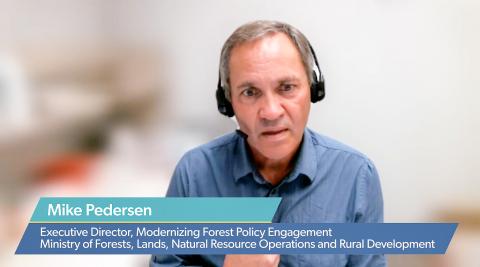Thursday’s workshop on Modernizing Forest Policy in BC provided an extensive update on current Ministry of Forests activities retooling the framework for forestry as it is practiced in the province to align with the Declaration on the Rights of Indigenous Peoples Act and other initiatives.
Delegates heard presentations about changes proposed for the Forest and Range Practices Act (FRPA) and the BC’s Old Growth Strategy. Together with the Modernizing Forestry in BC Intentions Paper, these efforts “represent a fundamental change in forest policy,” said Mike Pederson, Executive Director, Modernizing Forest Policy Engagement with the Ministry of Forests, Lands, Natural Resource Operations and Rural Development (FLNRORD).
The work to Improve FRPA includes a updating the legislative framework, unchanged since its implementation in 2003, and involves a shift to a landscape planning regime. “Some timber and non-timber resource values were not being protected and needed a more proactive, landscape level approach,” said Rachael Pollard, Director of the ministry’s Resource Practices Branch.
Plans will be developed with indigenous nations, “honouring reconciliation commitments and enabling opportunities for engagement,” with licensees and the public, said Ariel Taylor, manager of Indigenous Consultation & Negotiation.
Building on the recommendations of the Merkel-Gorley Old Growth Strategic Review, FLNRORD is working towards a mid-2023 deadline to develop a new policy for old forests.
Brian Bawtinheimer, Executive Director of the Resource Stewardship Division and Margaret Gibbs, Director of Provincial Stewardship Strategies, outlined how the 2020 report’s recommendations are being prioritized and advanced, “building a strategy that everyone can support. We are figuring out how to work collaboratively across these groups and reach lasting conclusions,” said Gibbs.
Bawtinheimer said his team is looking to build successful engagement with industry, environmental groups and local governments, with the changed decision-making framework that includes indigenous nations.
The engagement process and substance of the forest policy Intentions Paper was described by Pederson. Fulsome engagement has already been provided to BC local governments, which UBCM facilitated. These conversations, with mayors and chairs across the province, explained and received feedback on proposed changes to forestry tenures, including creating future and redistributing existing tenures, minimizing slash burning, re-integrating prescribed and cultural fire, and value-added manufacturing, among other topics.

